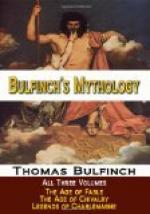Usk, British river
Utgard, abode of the giant Utgard Loki
Utgard LO’KI, King of the Giants (See Skrymir)
Uther (Uther Pendragon), king of Britain and father of Arthur,
UWAINE, knight of Arthur’s court
V
VAISSYAS, Hindu caste of agriculturists and traders
Valhalla, hall of Odin, heavenly residence of slain heroes
Valkyrie, armed and mounted warlike virgins, daughters of the gods (Norse), Odin’s messengers, who select slain heroes for Valhalla and serve them at their feasts
Ve, brother of Odin
VEDAS, Hindu sacred Scriptures
Venedotia, ancient name for North Wales
Venus (Aphrodite), goddess of beauty
Venus de Medici, famous antique statue
in Uffizi Gallery,
Florence, Italy
Verdandi, the Present, one of the Norns
Vertumnus, god of the changing seasons, whose varied appearances won the love of Pomona
Vesta, daughter of Cronos and Rhea, goddess of the homefire, or hearth
VESTALS, virgin priestesses in temple of Vesta
Vesuvius, Mount, volcano near Naples
Villains, peasants in the feudal scheme
VIGRID, final battle-field, with destruction of the gods ind their enemies, the sun, the earth, and time itself
VILI, brother of Odin and Ve
Virgil, celebrated Latin poet (See Aeneid)
Virgo, constellation of the Virgin, representing Astraea, goddess of innocence and purity
Vishnu, the Preserver, second of the three chief Hindu gods
Viviane, lady of magical powers, who allured the sage Merlin and imprisoned him in an enchanted wood
VOLSCENS, Rutulian troop leader who killed Nisus and Euryalus
Volsung, A saga, an Icelandic poem, giving about the same legends as the Nibelungen Lied
VORTIGERN, usurping King of Britain, defeated by Pendragon 390, 397
Vulcan (Greek, Haephestus), god of fire and metal working, with forges under Aetna, husband of Venus
VYA’SA, Hindu sage
W
Wain, the, constellation
Wellgunda, one of the Rhine-daughters
WELSH LANGUAGE
WESTERN OCEAN
WINDS, THE
WINTER
Woden, chief god in the Norse mythology, Anglo Saxon for Odin
Woglinda, one of the Rhine-daughters
Woman, creation of
Wooden horse, the, filled with armed men, but left outside of Troy as a pretended offering to Minerva when the Greeks feigned to sail away, accepted by the Trojans (See Sinon, and Laocoon), brought into the city, and at night emptied of the hidden Greek soldiers, who destroyed the town




